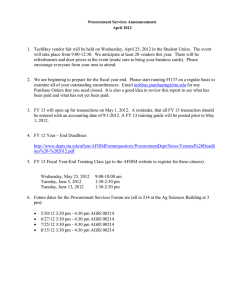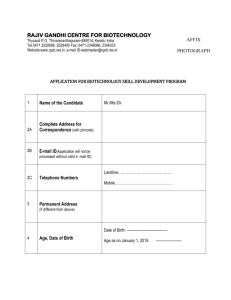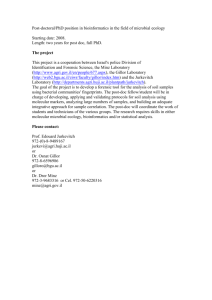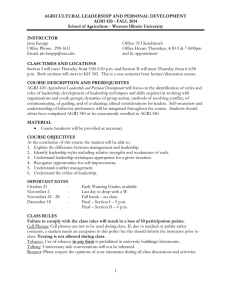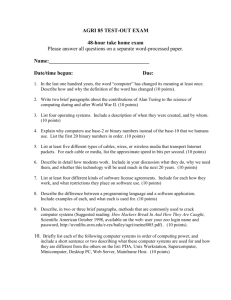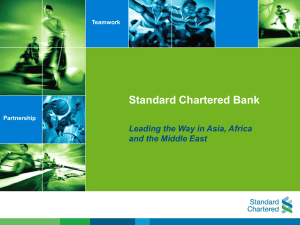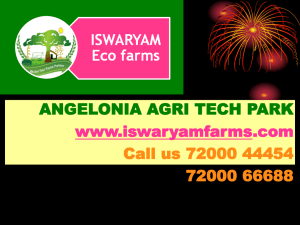Certificate in Agriscience and Technology – A109
advertisement
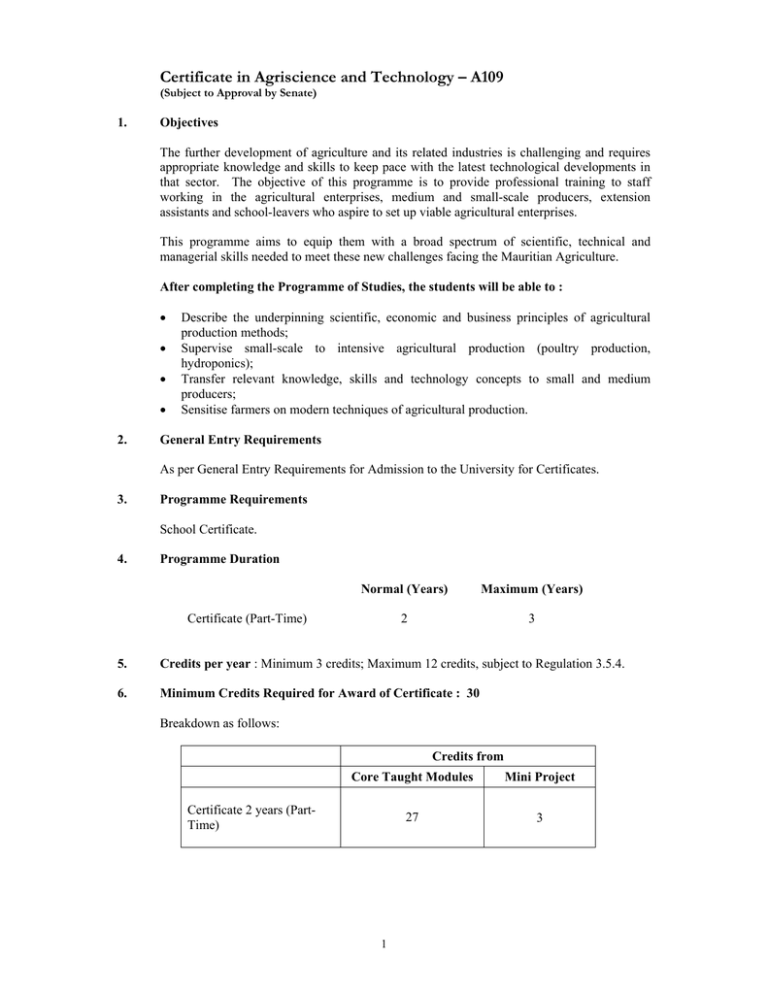
Certificate in Agriscience and Technology – A109 (Subject to Approval by Senate) 1. Objectives The further development of agriculture and its related industries is challenging and requires appropriate knowledge and skills to keep pace with the latest technological developments in that sector. The objective of this programme is to provide professional training to staff working in the agricultural enterprises, medium and small-scale producers, extension assistants and school-leavers who aspire to set up viable agricultural enterprises. This programme aims to equip them with a broad spectrum of scientific, technical and managerial skills needed to meet these new challenges facing the Mauritian Agriculture. After completing the Programme of Studies, the students will be able to : • • • • 2. Describe the underpinning scientific, economic and business principles of agricultural production methods; Supervise small-scale to intensive agricultural production (poultry production, hydroponics); Transfer relevant knowledge, skills and technology concepts to small and medium producers; Sensitise farmers on modern techniques of agricultural production. General Entry Requirements As per General Entry Requirements for Admission to the University for Certificates. 3. Programme Requirements School Certificate. 4. Programme Duration Normal (Years) Maximum (Years) 2 3 Certificate (Part-Time) 5. Credits per year : Minimum 3 credits; Maximum 12 credits, subject to Regulation 3.5.4. 6. Minimum Credits Required for Award of Certificate : 30 Breakdown as follows: Credits from Core Taught Modules Mini Project 27 3 Certificate 2 years (PartTime) 1 7. Assessment Each module will be assessed over 100 marks (i.e. expressed as %) with details as follows (unless otherwise specified) : Assessment will be based on a Written Examination of 2-hour duration, carrying a weighting of 70%, and Continuous Assessment carrying 30% of total marks for AGRI modules. Modules from other Faculties/Departments will carry a weighting of up to 30% for Continuous Assessment. Continuous Assessment will be based on laboratory/field works, and/or assignments, but should include at least 1 class test. A minimum of at least 30% should be attained in each of Continuous Assessment and Written Examination, with an overall total of 40% for a candidate to pass a module. All modules will carry 3 credits and weighting of 1. 8. Important Note The rules as stipulated in this Programme Structure and Outline Syllabus will replace all other rules and regulations. 9. List of Modules CORE MODULES Code Module AGRI 1036Y(1) AGRI 1037Y(1) AGRI 1038Y(1) AGRI 1039Y(1) AGRI 1040Y(1) Hrs/Wk L+P Basic Animal Science and Production 1 Crop Science and Technology 1 Soil Science and Irrigation Introductory Statistics and IT Pest Biology and Plant Protection AGRI 2055Y(1) AGRI 2056Y(1) Introduction to Food Science and Technology Introduction to Agricultural Economics, Management & Extension AGRI 2057Y(1) Basic Animal Science and Production 2 AGRI 2058Y(1) Crop Science and Technology 2 AGRI 2000Y(1) Mini-Project Total no. of credits: 30 2 Credits 30+30 30+30 30+30 30+30 30+30 3 3 3 3 3 30+30 30+30 3 3 30+30 30+30 - 3 3 3 10. Programme Plan – Certificate in Agriscience and Technology CORE MODULES YEAR 1 Code Module Name Hr / Yr L+P Credits AGRI 1036Y(1) AGRI 1037Y(1) AGRI 1038Y(1) AGRI 1039Y(1) AGRI 1040Y(1) Basic Animal Science and Production 1 Crop Science and Technology 1 Soil Science and Irrigation Introductory Statistics and IT Pest Biology and Plant Protection 30+30 30+30 30+30 30+30 30+30 3 3 3 3 3 30+30 30+30 3 3 30+30 30+30 3 3 - 3 YEAR 2 AGRI 2055Y(1) Introduction to Food Science and Technology AGRI 2056Y(1) Introduction to Agricultural Economics, Management & Extension AGRI 2057Y(1) Basic Animal Science and Production 2 AGRI 2058Y(1) Crop Science and Technology 2 AGRI 2000Y(1) Mini-Project Total no. of credits: 30 11. Outline Syllabus AGRI 1036Y(1) - BASIC ANIMAL SCIENCE AND PRODUCTION 1 Anatomy and physiology of farm animals (reproductive, digestive and muscle structure). Animal Production systems. Factors affecting animal productivity. Structure of tropical livestock production. Fundamental skills of animal husbandry: rationing, weighing and tagging, usage of preventive and diagnostic equipment, animal’s environment, evaluation of body condition score, performance records, animal behavior and welfare. AGRI 1037Y(1) - CROP SCIENCE AND TECHNOLOGY 1 Basic principles of agronomy. Crop physiology. Introductory crop propagation. Cropping systems. Field operations and techniques. Husbandry and production of selected fruits, vegetables and ornamentals. Good agricultural practices. Basic principles and practices of seed production. AGRI 1038Y(1) - SOIL SCIENCE AND IRRIGATION Soil formation, physical, chemical, biological, mineralogical and biochemical properties of soil, soils of Mauritius, soil degradation and soil management, soil productivity and soil fertility, Agrochemicals (pesticides and fertilizers), management, manufacture properties and application. Irrigation and efficient use of water in agriculture, types of Irrigation, use of treated wastewater and saline water for irrigation, soil moisture and its measurement, soil moisture retention characteristics. AGRI 1039Y(1) - INTRODUCTORY STATISTICS AND IT Nature of statistical data. Organization and presentation of data. Measures of central tendency and dispersion. Probability distributions. Relationship between variables. Methods of data collection. IT and Computers, Input and Output Devices, Secondary Storage. Introduction to applications software. 3 AGRI 1040Y(1) - PEST BIOLOGY AND PLANT PROTECTION Biology, ecology, damage caused and control of selected pests; Different Methods of pest control their principles and components; Techniques of IPM; Principles, components and economics of IPM. AGRI 2055Y(1) - INTRODUCTION TO FOOD SCIENCE AND TECHNOLOGY Concepts underpinning the field of food science and technology. Food composition and the chemistry of major food constituents, food groups and their role in nutrition and health; principles and methods of food preservation; microorganisms in food; food safety and quality. AGRI 2056Y(1) - INTRODUCTION TO AGRICULTURAL ECONOMICS, MANAGEMENT & EXTENSION Basic agricultural economics and marketing applied to agriculture, food and natural resources. Basic farm management principles. Entrepreneurship. Projects and Business plans. Farming systems. Basic principles of agricultural extension. Agricultural development and regional trade. AGRI 2057Y(1) - BASIC ANIMAL SCIENCE AND PRODUCTION 2 Principles of farm animal management, Animal production technologies (e.g. artificial insemination). Livestock waste management. Principles of Genetics. Improvement of farm animals. Disease causing agents. Impact of diseases on animal productivity. Disease prevention and control. AGRI 2058Y(1) - CROP SCIENCE AND TECHNOLOGY 2 Advantages and disadvantages of soilless and protected cultivation. Greenhouse design, structures, and location. Covering materials. Greenhouses and their operation. Hydroponics: concepts and systems. Growing media. Substrate hydroponics. Nutrient film technique. Plant nutrition and control. Cropping and production of selected fruits, vegetables and ornamentals. AGRI 2000Y(1) - MINI-PROJECT The project will be carried in the area of agriculture. 23 January 2008 4
